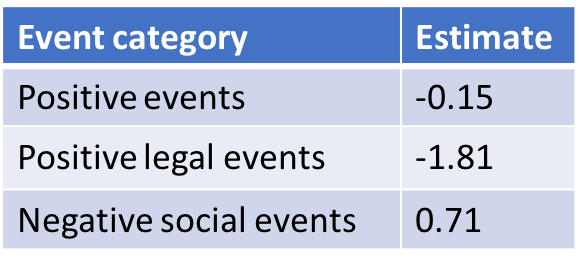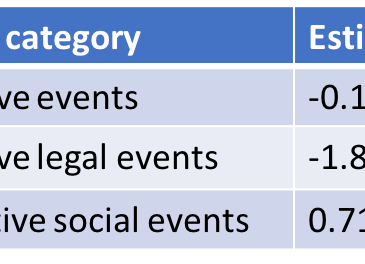Many people think of addiction as a disorder that is always progressive. However, as we described in our Special Series on Self-Directed Recovery, addiction, including Gambling Disorder, is more accurately characterized as an episodic condition; those who the condition affects move in and out of clinical thresholds, often without the aid of professional treatment. Today, we review a study by Alexandra Godinho and colleagues that explored how significant life events impact such gambling trajectories over time.
What was the research question?
Among people with gambling-related problems who intend to quit or limit their gambling, how are significant life events related to future changes in problem gambling severity?
What did the researchers do?
The researchers assembled a sample of 204 people with gambling-related problems who intended to quit or cut down on their gambling as part of a larger, 18-month prospective study. Participants completed assessments at baseline and at 3, 6, 9, and 12 months post-baseline. The researchers used the Problem Gambling Severity Index to categorize participants in terms of their gambling severity.[1] The participants reported on whether a series of major life events happened to them and whether they perceived that those life events had positive, negative, or neutral effects. The researchers tested how well several theoretical and data-driven mixed-effect models explained the observed relationships between life events and changes in problem gambling severity. We report on some of their findings here.
What did they find?
First, the researchers looked broadly at the number of positive and negative life events each participant perceived they experienced. They found that the perception of experiencing more positive life events was associated with reduced gambling severity over time. More specifically, they observed that experiencing positive legal events (e.g., being released from jail) was associated with reduced gambling severity over time. On the other hand, experiencing negative social events (e.g., separation from spouse or partner, death of spouse or partner) was associated with smaller reductions in gambling severity, or even worsening gambling severity. See Figure.

Figure. Mixed-effect model estimates of associations between life events and future gambling severity. Negative estimates indicate that the life events preceded reductions in gambling severity. Positive estimates indicate that the life events preceded increases in gambling severity. The size of the estimate indicates the strength of the association. All estimates are statistically significant. Click image to enlarge.
Why do these findings matter?
These findings suggest that among people who want to reduce or quit gambling, positive life events precede–or might even cause– healthy changes. Perhaps certain life events, like being released from jail or starting a business, spark healthy change because they alter how people see themselves. If true, this explanation might help researchers and others create more useful public health campaigns and brief interventions for gambling.
Every study has limitations. What were the limitations in this study?
Because the researchers used a prospective design, they could document whether certain life events preceded changes in gambling trajectories. But they still couldn’t document whether those life events caused those changes. Also, it will be important to confirm these exploratory findings with larger samples of participants.
For more information:
Do you think you or someone you know has a gambling problem? Visit the National Council on Problem Gambling for screening tools and resources. For additional resources, including gambling and self-help tools, visit The BASIS addiction resources page.
— Heather Gray
What do you think? Please use the comment link below to provide feedback on this article.
________________
[1] All measures used a 12-month reference point for the baseline assessment, and a 3-month reference point for follow-up assessments.




